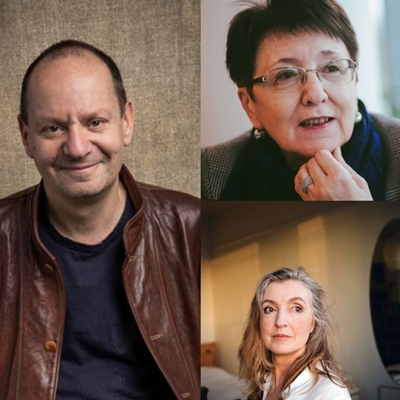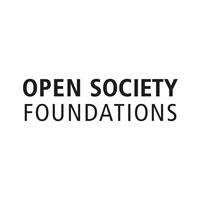Lviv BookForum 2023
Event 8
Events taking place live online 5–9 October 2023
How the Maidan Revolution changed us
Read moreThe Maidan Revolution - or Revolution of Dignity - took place in Ukraine in February 2014 at the end of the Euromaidan protests. Deadly clashes between protesters and state forces in the capital Kyiv culminated in the ousting of elected President Viktor Yanukovych and a return to the 2004 Constitution. An expert panel of contributors explores its significance as a turning point in Ukrainian history. With Kateryna Kalytko, Vitalii Portnykov and Antin Borkovski.

Event 16
Events taking place live online 5–9 October 2023
Yaryna Chornohuz, Luke Harding, Svitlana Povaliaeva and David Rieff, chaired by Tetyana Ogarkova
Fighting for or with words? The challenges of speaking about war
Read moreWar can both engender clamour and silence. Some people feel it imperative to talk about every life lost and every building destroyed, channelling their emotions into creative expression. For others, war means silence, stripping them of their ability to vocalize trauma and their experiences.
Journalist Luke Harding, writer David Rieff, poet and combat medic Yaryna Chornohuz and Svitlana Povaliaeva explore the emotional and professional space between experiencing and narrating war. Chaired by journalist Tetyana Ogarkova, the panel will discuss who can write about war, how conflict should be written about and the challenges of doing so, and what books can teach us about war.

Event 15
Events taking place live online 5–9 October 2023
Elif Batuman, Paata Shamugia (digital), Ewa Thompson (digital) and Oksana Zabuzhko, chaired by Charlotte Higgins
Colonial discourse in Russian literature: How we (mis)understood the 'Russian soul'
Read moreRussian imperialism, and how Russian writers have contributed to building the myth of the country is the topic of academic Ewa Thompson’s book Imperial Knowledge: Russian Literature and Colonialism. Published in 2000, the year in which Vladamir Putin became president, the book and its topic hold even greater relevance now.
Thompson is joined by novelists Oksana Zabuzhko and Elif Batuman and poet Paata Shamugia to discuss why literary critics failed to see Russia as a colonial power, whether Russian imperialist discourse differs from colonial discourse in Western literary traditions, and the role Ukraine can have in helping people re-read Russian literature through a lens that takes the current conflict into account. The discussion is chaired by the Guardian’s chief culture writer Charlotte Higgins.
Paata Shamugia and Ewa Thompson will join remotely
Closed captions are available for this event in English and Spanish. Click on the "cc" icon in the video frame to select.

Event 22
Events taking place live online 5–9 October 2023
Tamara Hundorova (digital), Philippe Sands (digital) and Rebecca Solnit (digital), chaired by Sasha Dovzhuk
Global consequences of Russia's ecocide in Ukraine
Read moreThe war in Ukraine is causing large amounts of damage to the environment. Weapon systems and mass burials are causing soil contamination, while Russia’s destruction of the Kakhovka hydroelectric power plant has devastated entire ecosystems in southern Ukraine, raised the risk of waterborne diseases and destroyed irrigation systems and farmlands, threatening global food security. Russian shellfire near the Zaporizhzhia nuclear power plant fuels fears of a nuclear catastrophe.
The shadow of history also looms over the conflict’s environmental effects; the explosion of the Chernobyl nuclear power station was a catalyst for the beginning of the end of the Soviet Union, and cultural revolution in Ukraine.
Lawyer and writer Philippe Sands, literary critic Tamara Hundorova and writer Rebecca Solnit talk to writer Sasha Dovzhuk about how Russia’s actions are affecting the global ecology and whether international law can prevent a new ecological catastrophe.
All the speakers except Sasha Dvozhuk will join remotely
Closed captions are available for this event in English and Spanish. Click on the "cc" icon in the video frame to select.

Event 17
Events taking place live online 5–9 October 2023
Babyn Yar: Listening to the Past
Read moreBabyn Yar, a ravine in the Ukrainian capital Kyiv, was the site of massacres carried out by Nazi Germany's forces during its campaign against the Soviet Union in World War II. On 29–30 September 1941 alone, some 33,771 Jews were killed. Other victims of massacres at the site included Soviet prisoners of war, communists and Romani people. An expert panel gathers to remember the tragedy and honour its victims.
Participants:
Dr. Paul Robert Magocsi (he will join remotely), Chair of Ukrainian Studies, University of Toronto; Board Member, Ukrainian Jewish Encounter (Toronto, Canada). Dr. Vladyslav Hrynevych, Senior Research Fellow at the Institute of Political and Ethnic Studies, National Academy of Sciences of Ukraine (Kyiv, Ukraine). Dr. Ihor Schupak, Director, Tkuma Ukrainian Institute for the Study of the Holocaust and of the Museum of Jewish Memory and the Holocaust; Board Member, Ukrainian Jewish Encounter (Dnipro, Ukraine). Dr. Yegor Vradiy, Assistant Director of the Tkuma Ukrainian Institute for the Study of the Holocaust and of the Museum of Jewish Memory and the Holocaust (Dnipro, Ukraine).
Moderator: Oksana Forostyna, Europe's Futures Fellow at the Institute for Human Sciences in Vienna (Kyiv, Ukraine).


